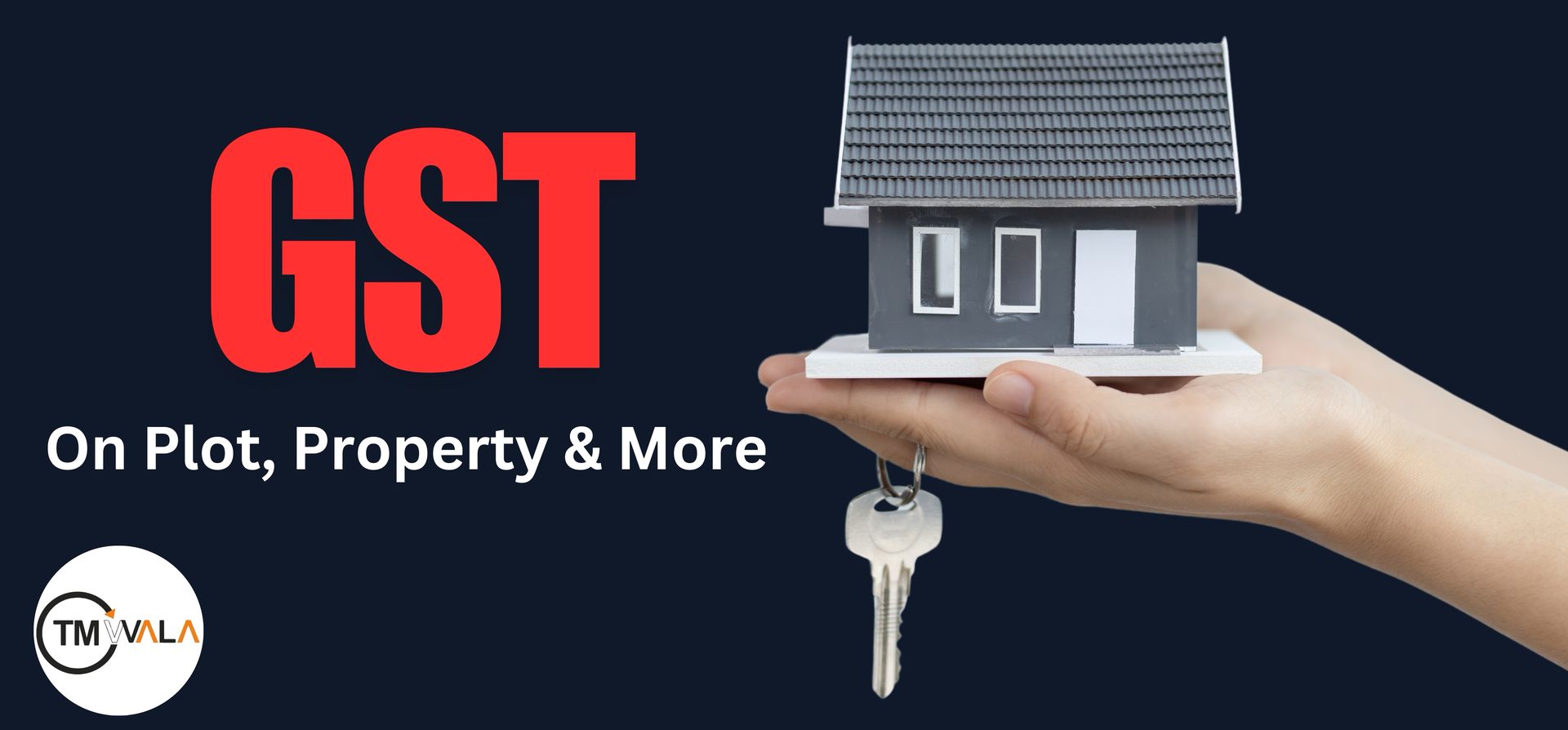
₹4,000.00 Original price was: ₹4,000.00.₹1,999.00Current price is: ₹1,999.00.

₹8,000.00 Original price was: ₹8,000.00.₹3,999.00Current price is: ₹3,999.00.

The Goods and Services Tax (GST) 2017, has ushered in substantial changes to the Indian real estate industry today. These changes are impacting land transactions as whole, but also sale of developed plots, completed houses, and townships. Comprehending these implications is important for all developers, investors, and buyers.
In order to comply with taxation and maximize financial planning as both buyers and sellers it is pertinent to understand the law at hand. Lets learn about the applicability of GST and GST rate on various types of property transactions and latest changes in the law.
When it comes to real estate transactions, the GST rates really depend on the “nature of the sale.” In simpler terms, the law makes a distinction between selling land, selling properties that are still under construction, and selling properties that are ready to move into.
The sale of undeveloped land is exempt from GST. This is in accordance to Schedule III of CGST Act, 2017, sale of land is neither supply of goods nor supply of services. So, if a person sells a plot of land without any development, it does not attract GST.
But this exemption is only for “pure land” transaction. If any services or development activity is done on the land before sale, it may attract GST.
When land is sold with infrastructural development – roads, drainage, water pipelines, sewage systems, lighting – GST becomes applicable. Government has clarified through various advance rulings that such developments are “supply of services” and are liable to GST.
GST Rate: GST rate on developed plots is 18% but only on development cost and not on land value itself.
Recent Clarifications: AAR in multiple cases has held that GST is payable on the portion of the transaction attributable to land development.
Case Law: In a ruling by Madhya Pradesh AAR (2020, it was held that any plot sold with infrastructure development is supply of service and liable to GST.
The taxation of fully constructed houses depends on whether the completion certificate has been issued at the time of sale.
If a house or apartment is sold after obtaining the completion certificate from the relevant authority, it is treated as an immovable property.
Since GST does not apply to the sale of immovable property, no tax is levied on such transactions.
Example: If a person buys a ready-to-move-in apartment from a builder, no GST is applicable.
The sale of an under-construction property is considered a supply of service and is taxable under GST.
GST Rate:5% (without Input Tax Credit) for standard under-construction residential properties.
1% for affordable housing projects.
If a person books a flat before completion and makes payments in instalments, GST is applicable on each instalment.
In a Joint Development Agreement or a JDA, a landowner collaborates with a developer to construct residential or commercial properties. JDAs involve different GST implications:
GST Rate: The sale of under-construction flats by the developer attracts a 5% or 1% GST, depending on the project type.
Input Tax Credit (ITC): The GST rates on real estate projects do not allow ITC benefits, meaning developers cannot claim credit for GST paid on inputs like cement and steel.
Township developments involve multiple aspects, such as residential units, commercial spaces, infrastructure development, and common amenities. The GST applicability varies for each component:
Residential Units: Under-construction units attract GST at 5% or 1%.
Common Infrastructure Development: The cost of roads, parks, water supply, and sewage treatment attracts 18% GST on the service portion.
Commercial Spaces: The sale of under-construction commercial units attracts 12% GST with ITC benefits.
As per the 34th meeting of the GST Council in 2019, the GST rates were revised for real estate to provide relief to homebuyers. The revised rates that are 5% and 1% were introduced without ITC to prevent tax evasion and ensure a simplified tax structure.
The government defines affordable housing as:
Such projects benefit from a lower GST rate of 1%, making housing more affordable for middle-class buyers.
Developers cannot claim Input Tax Credit (ITC) on building materials if they opt for the new tax rates. Without ITC, developers have to include GST costs in pricing, potentially increasing property rates. Some developers prefer the old 12% GST rate with ITC to reduce input costs.
While developed plots are taxable, there is no standardized formula to separate land value from the development cost. Developers and tax authorities often dispute the taxable portion.
Buyers and sellers must ensure that invoices clearly distinguish land cost and development cost to avoid unnecessary tax liabilities.
Thus, the developers must comply with the anti-profiteering measures to prevent price hikes in lieu of tax rate changes.
Understanding GST implications on real estate transactions is essential for both buyers and developers. While the sale of raw land and completed properties remains tax-free, transactions involving under-construction properties and developed plots attract GST.
By staying informed about tax rate changes, ITC provisions, and compliance requirements, developers and homebuyers can navigate GST laws effectively and make informed real estate decisions.
Author Details- Apoorva Lamba (2nd Year Student Madhav Mahavidyalya,Jiwaji University,Gwalior)
References-
https://getswipe.in/blog/article/gst-on-sale-of-land-and-plots
You Might Also Like-
Get started instantly

TMWala
Your one stop shop for all your business registration and compliance needs.
Our Services
© Copyright TMWala. All rights reserved
Choose your Entity Type
Individual/ MSME/ Sole Proprietorships
Non-MSME/ Large Entities

₹1,500.00 Original price was: ₹1,500.00.₹999.00Current price is: ₹999.00.
Trademark Application @ ₹999* (Basic Discounted Plan for MSME/Individual/Sole Proprietorships) Best-Selling, Economical & Easy

₹1,500.00 Original price was: ₹1,500.00.₹999.00Current price is: ₹999.00.
Trademark Application @ ₹999* (Basic Discounted Plan for Non-MSMEs/Large Entities) Best-Selling, Economical, Quick and Easy
Choose your Entity Type
Individual/ MSME/ Sole Proprietorships
Non-MSME/ Large Entities
₹3,500.00 Original price was: ₹3,500.00.₹1,999.00Current price is: ₹1,999.00.
Government Fees
₹4500/-
₹3,500.00 Original price was: ₹3,500.00.₹1,999.00Current price is: ₹1,999.00.
Government Fees
₹9000/-
Choose your Entity Type
Non-MSME/ Large Entitie
Individual/ MSME/ Sole Proprietorships

₹9,000.00 Original price was: ₹9,000.00.₹3,999.00Current price is: ₹3,999.00.
Trademark Application @ ₹3999* (Premium Discounted Plan for Non-MSMEs/Large Entities) Comprehensive
Government Fees
₹9000/-

₹9,000.00 Original price was: ₹9,000.00.₹3,999.00Current price is: ₹3,999.00.
Trademark Application @ ₹3999* (Premium Discounted Plan for MSME/Individual/Sole Proprietorships) Comprehensive
Government Fees
₹4500/-